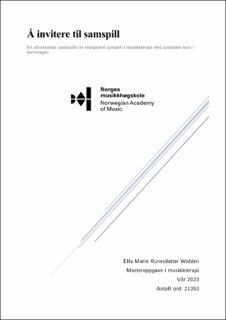Å invitere til samspill. En utforskende casestudie av relasjonelt samspill i musikkterapi med autistiske barn i barnehagen
Master thesis
Published version
Permanent lenke
https://hdl.handle.net/11250/3099217Utgivelsesdato
2023Metadata
Vis full innførselSamlinger
- Masteroppgaver [283]
Sammendrag
Sammendrag -
Barnehageloven presiserer at barnehagen skal være en helsefremmende arena som plikter å tilrettelegge for barns rett til medvirkning, deltakelse og utvikling. Det er ulike praksiser for hvordan disse perspektivene ivaretas i Norge. I denne oppgaven sees det nærmere på barnehagehverdagen for autistiske barn, og hvordan musikkterapi kan bidra inn i barnehagen for å ivareta elementene presentert i barnehageloven.
Denne masteroppgaven er en kvalitativ og utforskende studie av relasjonelt samspill i musikkterapi. Problemstillingen er Hvordan kan musikkterapi brukes i utforsking av relasjonelt samspill med autistiske barn i barnehagen? Videre besvarer oppgaven to forskningsspørsmål: Hvordan legge til rette for autistiske barns medvirkning i musikkterapi? og Kan musikkterapeutisk improvisasjon være en ressurs i arbeid med autistiske barn – og på hvilken måte? Data er samlet inn gjennom deltakende observasjon, løpende loggføring og videoopptak. Studien utforsker både samspill mellom barn og musikkterapeut, men også samspill mellom barn, gjennom gruppesesjoner i musikkterapi.
Resultatene viser at musikkterapi kan brukes for å tilrettelegge for relasjonelt samspill med autistiske barn i barnehagen. Videre kan musikkterapi være en arena som tilrettelegger for barns medvirkning, både innenfor rammene av musikkterapisesjonene, men også på systemnivå i barnehagen. Musikkterapeutisk improvisasjon som tilnærming muliggjør et bredt spenn av kommunikasjonsuttrykk som ivaretar barnas initiativ og relasjonelle samspill.
Studien er forankret i en humanistisk og ressursorientert musikkterapitradisjon. Videre er oppgaven informert av nevrodiversitetsperspektivet, med autistiske stemmer gjennomgående i hele oppgaven.
Emneord: Musikkterapi, Autisme, Nevrodiversitet, Barnehage, Medvirkning, Relasjon, Improvisasjon Abstract -
Kindergartens are mandated by Norwegian law to ensure a health promoting arena to facilitate children’s right to participation, inclusion, and development. This is practiced in different ways in kindergartens in Norway. This thesis is based on a project situated in a kindergarten with autistic children, and explores if and how music therapy and the relationships formed through it can be a health promoting tool in this context.
This thesis is a qualitative and explorative study of relational interaction in music therapy. The main problem statement is How can music therapy be used in exploring relational interaction with autistic children in the kindergarten? Furthermore, I´ve answered two research questions: How to facilitate for participation for autistic children through music therapy? and Can creative clinical improvisation be a resource when working with autistic children – in what way? Data was collected through participant observation, written logs, and video. The study is exploring both interplay between music therapist and children, and interplay between children in groups.
The results show that music therapy can be used to facilitate relational interaction with autistic children. Furthermore, music therapy can be an arena which facilitates active participation both on an individual level in the music therapy-sessions, and on a system level in the kindergarten. Creative clinical improvisation makes it possible to engage and communicate in a broad spectrum of ways, while taking the children’s initiatives into consideration. The study is placed in a Norwegian context, and based on humanistic and resource-oriented views on music therapy. The thesis is informed by a neurodiversity perspective, with the autistic voice present through the entire thesis.
Keywords: Music Therapy, Autism, Neurodiversity, Kindergarten, Participation, Relation, Improvisation
Beskrivelse
Norges musikkhøgskole. Masteroppgave. Musikkterapi.
